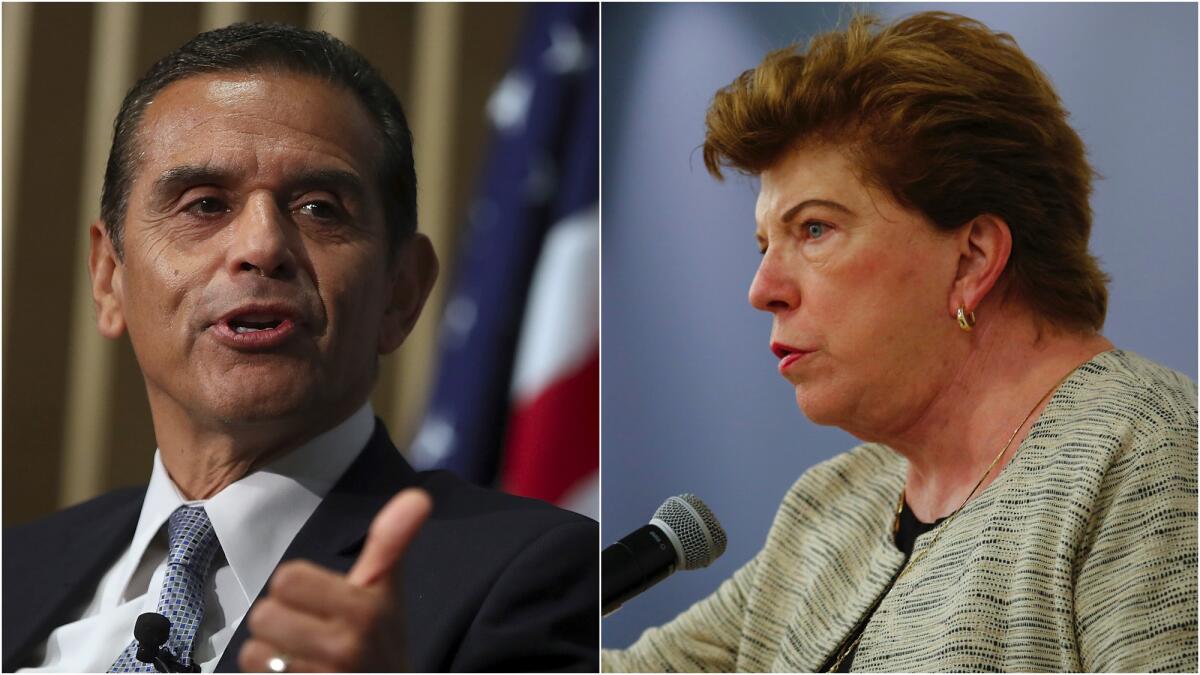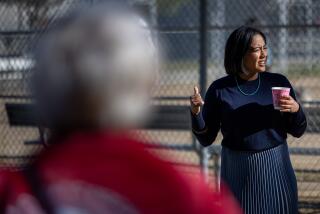Column: That powerful elected office a candidate held years ago? California voters won’t see it when they mark their 2018 ballot

Of all his former political posts, Antonio Villaraigosa is most widely known for serving eight years as mayor of Los Angeles, a powerful position that he’s counting on voters to remember as they scan next year’s ballot in the race for governor.
Except he can’t call himself the former mayor. His rival, former state Superintendent of Public Instruction Delaine Eastin, can’t use her previous title, either.
For the record:
4:30 a.m. Dec. 11, 2017An earlier version of this column identified Assemblyman Juan Arambula (D-Fresno) as the lawmaker who listed his ballot description as “Emergency Room Doctor.” The lawmaker was Assemblyman Joaquin Arambula (D-Fresno).
The state election rules governing a candidate’s ballot description may have been designed to keep things fair and square, but they’ve instead given way to linguistic contortions that often confuse more than clarify.
It all comes down to three words: the allowed space for candidates to describe their “profession, vocation, or occupation.” Those descriptions, under California election law, can be rejected when “there is a substantial likelihood that a reasonably prudent voter would be misled.”
But that leaves substantial room for interpretation. In fact, it seems the widely accepted rule of thumb is this: Don’t make yourself sound like a politician. Five California incumbents — one member of Congress and four members of the Legislature — didn’t even mention their day jobs in 2016. Rep. David Valadao (R-Hanford) called himself a “Farmer/Small Businessman.” Assemblyman Joaquin Arambula (D-Fresno) was listed only as an “Emergency Room Doctor.”
Other incumbents added some flair to their elected office: business owner, educator, rancher, mother.
“Over the years, candidates and consultants have gotten very creative in choosing the three-word description,” said Thomas Hiltachk, a Republican campaign attorney.
It’s particularly important in down-ballot races where voters have little to no information about candidates. And in most instances, it’s an honor system until someone raises a ruckus and heads to court. In 2012, a judge ruled the former Los Angeles city attorney could not be called “Los Angeles chief prosecutor” in the race for district attorney.
Political Road Map: The major parties just aren’t cutting it for California voters »
Villaraigosa left the mayor’s office in 2013; Eastin stepped down as state schools chief in 2003. Contrast that with the other two prominent Democrats in the race — Lt. Gov. Gavin Newsom and state Treasurer John Chiang, who can both use their impressive titles on the ballot.
Some political professionals criticized a recent USC Dornsife/Los Angeles Times poll on this very issue. The pollsters used Villaraigosa and Eastin’s former titles in gauging support, likely to see what might happen in a campaign where résumés are well known.
Eastin, who polled at only 4% among registered voters, may have the most at stake in reminding voters that she’s the candidate with significant experience in education policy. In a Sacramento politics newsletter last weekend, the Northern California Democrat was given some free advice on how to spice up her designation.
“As a campaign advisor, I would tell her to lean on a community college to give her a part-time one class teaching assignment and she could be listed as ‘Educator,’” wrote Scott Lay, the newsletter’s author. “When I was a community college advocate, I hated it, but lots of great legislators were elected through that strategy.”
Neither Eastin nor Villaraigosa has decided what they will be called on next year’s ballot. They also have something else in common: Both are aiming for voters to have more information about them than just those three words.
Follow @johnmyers on Twitter, sign up for our daily Essential Politics newsletter and listen to the weekly California Politics Podcast
ALSO:
Updates on California politics
More to Read
Get the L.A. Times Politics newsletter
Deeply reported insights into legislation, politics and policy from Sacramento, Washington and beyond. In your inbox three times per week.
You may occasionally receive promotional content from the Los Angeles Times.







